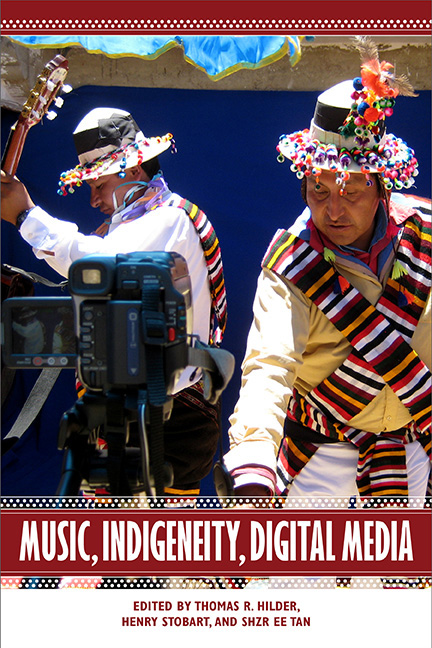Book contents
- Frontmatter
- Dedication
- Contents
- List of Illustrations
- Acknowledgments
- Music, Indigeneity, Digital Media: An Introduction
- 1 Taiwan's Aboriginal Music on the Internet
- 2 Recording Technology, Traditioning, and Urban American Indian Powwow Performance
- 3 YouTubing the “Other”: Lima's Upper Classes and Andean Imaginaries
- 4 An Interview with Russell Wallace
- 5 Mixing It Up: A Comparative Approach to Sámi Audio Production
- 6 Creative Pragmatism: Competency and Aesthetics in Bolivian Indigenous Music Video (VCD) Production
- 7 Keepsakes and Surrogates: Hijacking Music Technology at Wadeye (Northwest Australia)
- 8 The Politics of Virtuality: Sámi Cultural Simulation through Digital Musical Media
- Selected Bibliography
- List of Contributors
- Index
3 - YouTubing the “Other”: Lima's Upper Classes and Andean Imaginaries
Published online by Cambridge University Press: 26 April 2018
- Frontmatter
- Dedication
- Contents
- List of Illustrations
- Acknowledgments
- Music, Indigeneity, Digital Media: An Introduction
- 1 Taiwan's Aboriginal Music on the Internet
- 2 Recording Technology, Traditioning, and Urban American Indian Powwow Performance
- 3 YouTubing the “Other”: Lima's Upper Classes and Andean Imaginaries
- 4 An Interview with Russell Wallace
- 5 Mixing It Up: A Comparative Approach to Sámi Audio Production
- 6 Creative Pragmatism: Competency and Aesthetics in Bolivian Indigenous Music Video (VCD) Production
- 7 Keepsakes and Surrogates: Hijacking Music Technology at Wadeye (Northwest Australia)
- 8 The Politics of Virtuality: Sámi Cultural Simulation through Digital Musical Media
- Selected Bibliography
- List of Contributors
- Index
Summary
Some years ago I worked as a music teacher at a wealthy school in Lima. Most of my students lived in gated neighborhoods far from Lima's center and were driven to school by the family chauffeur instead of using public transportation. Their friends mainly lived in the same four exclusive districts, and therefore they did not need to go to other parts of Lima. Teaching a lesson to a fourth grade (nine-year-olds) on contemporary Andean music, I asked the students to name their favorite singer. They all started to laugh, watching each other and looking at me as if I were mad. Nobody said anything, but then one little blonde girl stood up and told me, blushing and looking at the floor, that she liked Dina Paucar. A bunch of girls whispered “chola” and laughed behind her back. I asked how many of them had maids—everyone had one, “of course”— so the immediate assignment was to interview their maids about contemporary Andean singers in Lima. There was an awkward silence. Another girl stood up saying: “Miss, my father will kill me if I talk to my maid.” Others saw it as a radically different music assignment (they were accustomed to receiving Western art music lessons), so they did not complain. I was expecting letters from angry parents and even being fired for this. But the girls amazed me with interesting interviews, posters, CDs (or VCDs borrowed from their maids), and some were quite moved by sharing something with their maids again: “Maria was like my mother, she raised me, I don't know why I stopped talking to her.”
Similar experiences motivated me to explore the Lima upper-class relationship with Andean music (be this traditional, contemporary, or fusion), their ideas of the Andean person (el Andino) and the articulation of people from different ethnic and socioeconomic backgrounds through music. I am aware that, strictly speaking, nearly all music is likely to be a fusion of previous genres. However, in Lima, only a limited range of music is considered as such by the public, or even by musicians.
- Type
- Chapter
- Information
- Music, Indigeneity, Digital Media , pp. 74 - 94Publisher: Boydell & BrewerPrint publication year: 2017



